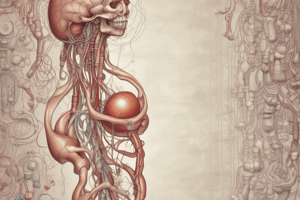Podcast
Questions and Answers
What is the primary function of the urinary system?
What is the primary function of the urinary system?
- To regulate body temperature
- To produce hormones that help regulate blood pressure
- To remove waste and excess fluids from the blood (correct)
- To store nutrients for energy production
Which of the following organs is responsible for storing urine until it is eliminated from the body?
Which of the following organs is responsible for storing urine until it is eliminated from the body?
- Ureters
- Bladder (correct)
- Urethra
- Kidneys
What is the functional unit of the kidney responsible for filtering waste and excess fluids from the blood?
What is the functional unit of the kidney responsible for filtering waste and excess fluids from the blood?
- Cortex
- Nephron (correct)
- Renal tubule
- Glomerulus
What is the process by which the renal tubule reabsorbs necessary substances back into the blood?
What is the process by which the renal tubule reabsorbs necessary substances back into the blood?
What is the term for the involuntary contraction of the bladder muscles, causing urine to be eliminated from the body?
What is the term for the involuntary contraction of the bladder muscles, causing urine to be eliminated from the body?
What is the term for bacterial infections of the urinary system?
What is the term for bacterial infections of the urinary system?
Which of the following is a function of the urinary system?
Which of the following is a function of the urinary system?
What is the term for long-term damage to the kidneys, leading to impaired function?
What is the term for long-term damage to the kidneys, leading to impaired function?
Flashcards are hidden until you start studying
Study Notes
Overview of the Urinary System
The urinary system, also known as the renal system, is responsible for producing, storing, and eliminating urine from the body.
Functions of the Urinary System
- Removes waste and excess fluids from the blood
- Regulates electrolyte levels and pH balance
- Produces hormones that help regulate blood pressure
- Helps to maintain strong bones by regulating calcium and phosphorus levels
Organs of the Urinary System
- Kidneys: filter waste and excess fluids from the blood, producing urine
- Ureters: tubes that connect the kidneys to the bladder, carrying urine from the kidneys to the bladder
- Bladder: stores urine until it is eliminated from the body
- Urethra: tube that carries urine from the bladder to the outside of the body
Kidney Structure
- Cortex: outer layer of the kidney, responsible for filtering the blood
- Medulla: inner layer of the kidney, responsible for concentrating and collecting urine
- Nephrons: functional units of the kidney, responsible for filtering waste and excess fluids from the blood
- Glomerulus: cluster of capillaries that filter the blood
- Renal tubule: tube that collects and processes the filtered fluid
Urine Formation
- Glomerular filtration: process by which the glomerulus filters the blood, producing a filtrate
- Tubular reabsorption: process by which the renal tubule reabsorbs necessary substances back into the blood
- Tubular secretion: process by which the renal tubule secretes waste and excess substances into the urine
Micturition (Urination)
- Urination reflex: involuntary contraction of the bladder muscles, causing urine to be eliminated from the body
- Voluntary control: conscious control over the urination process, allowing for delayed urination
Clinical Relevance
- Urinary tract infections (UTIs): bacterial infections of the urinary system
- Kidney stones: solid masses that form in the kidneys or urinary tract
- Chronic kidney disease: long-term damage to the kidneys, leading to impaired function
Overview of the Urinary System
- The urinary system is responsible for producing, storing, and eliminating urine from the body.
Functions of the Urinary System
- Removes waste and excess fluids from the blood.
- Regulates electrolyte levels and pH balance.
- Produces hormones that help regulate blood pressure.
- Helps to maintain strong bones by regulating calcium and phosphorus levels.
Organs of the Urinary System
- Kidneys filter waste and excess fluids from the blood, producing urine.
- Ureters are tubes that connect the kidneys to the bladder, carrying urine from the kidneys to the bladder.
- Bladder stores urine until it is eliminated from the body.
- Urethra is a tube that carries urine from the bladder to the outside of the body.
Kidney Structure
- Cortex is the outer layer of the kidney, responsible for filtering the blood.
- Medulla is the inner layer of the kidney, responsible for concentrating and collecting urine.
- Nephrons are functional units of the kidney, responsible for filtering waste and excess fluids from the blood.
- Glomerulus is a cluster of capillaries that filter the blood.
- Renal tubule is a tube that collects and processes the filtered fluid.
Urine Formation
- Glomerular filtration is the process by which the glomerulus filters the blood, producing a filtrate.
- Tubular reabsorption is the process by which the renal tubule reabsorbs necessary substances back into the blood.
- Tubular secretion is the process by which the renal tubule secretes waste and excess substances into the urine.
Micturition (Urination)
- Urination reflex is an involuntary contraction of the bladder muscles, causing urine to be eliminated from the body.
- Voluntary control allows for conscious control over the urination process, allowing for delayed urination.
Clinical Relevance
- Urinary tract infections (UTIs) are bacterial infections of the urinary system.
- Kidney stones are solid masses that form in the kidneys or urinary tract.
- Chronic kidney disease is long-term damage to the kidneys, leading to impaired function.
Studying That Suits You
Use AI to generate personalized quizzes and flashcards to suit your learning preferences.



